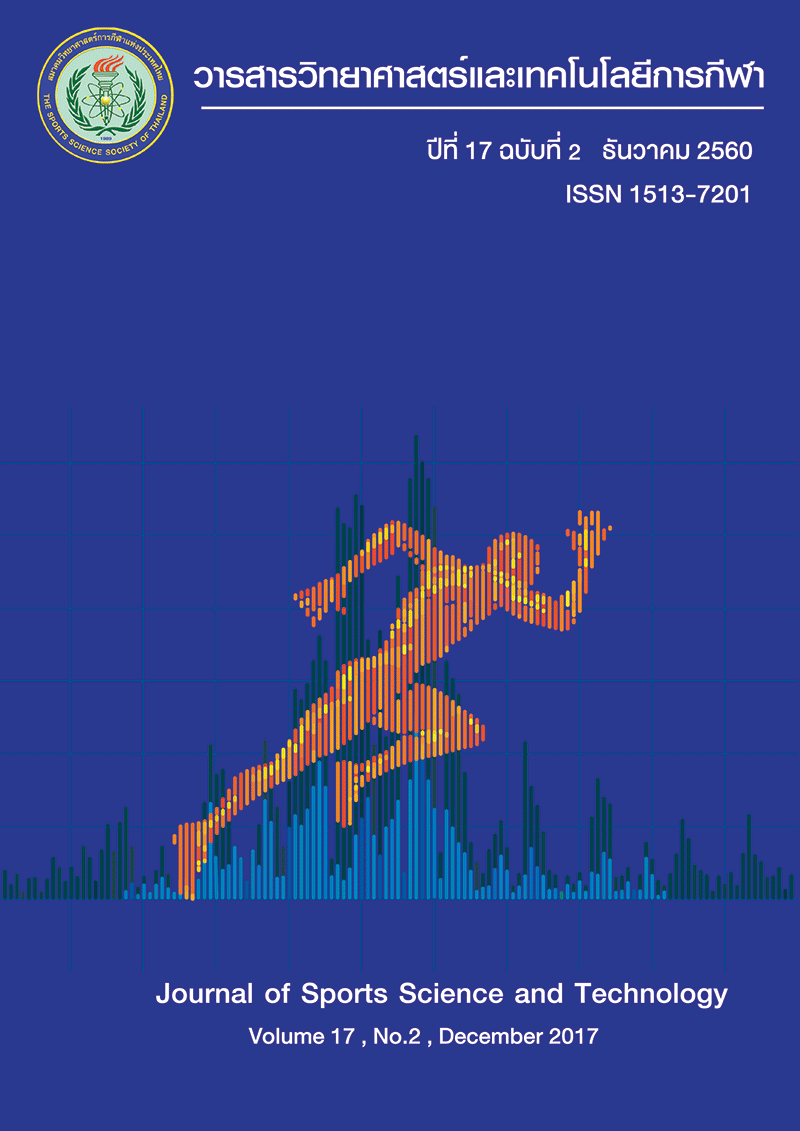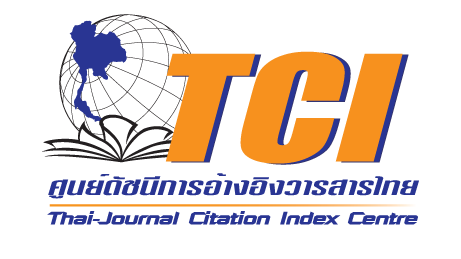EFFECTS OF CLASSICAL RELAXATION TECHNIC ON STRESS LEVEL OF STUDENTS IN A HIGHER EDUCATION INSTITUTE
Keywords:
Classical relaxation technic / Stress / Neuro Linguistic Programming / AthletesAbstract
The purpose of this research was to study effects of classical relaxation technique on stress level of students in a higher education institute. This research was an experimental research design. The sample of students from the faculty of sports science, Burapha University, in the 2558 academic year. The volunteered participants had moderate stress levels (stress score of 24 points or more) were drawn by a simple random sampling, 52 persons. and arrange the subjects to the experimental group and the control group, with 26 persons each. The instruments consist of Suanprung stress test-20 of the Department of Mental Health (Cronbach's Alpha Coefficient 0.86 ), finger thermometer, classical relaxation script. The researcher used Suanprung stress test and finger thermometer in pre-test and post - test periods. The experimental group received relaxation training by classical relaxation technique, one session of six minutes, three times a week for eight weeks. The control group sat to rest for six minutes. The data analysis was done by t-test. The results revealed that:
1. At the post-test period, the experimental group had no different on stress scores from the pre-test period. The experimental group had no different on stress scores from the control group.
2. At the post-test period, the experimental group had higher finger temperature than the pre-test period with a statistically significant at .05 level. The experimental group had higher finger temperature from the control group with a statistically significant at .05 level.
(Journal of Sports Science and Technology 2017; 17(2): 31-43)
Keywords: Classical relaxation technic / Stress / Neuro Linguistic Programming / Athletes
*Corresponding author: Tanida JULVANICHPONG Faculty of Sport Science, Burapha University, Bangsaen, Chonburi, Thailand 20131 E-mail: tanida@buu.ac.th
References
Brewster, E. M. Learning and neuro-linguistic-programming a theoretical discourse. [Internet].2000 [cited 2006 May 12].
Available from: http://www.nlp.at/theorie/sl/diplom.pdf.
Knight, S. NLP solutions. London: Nicholas Brealey. 1999.
Villar, I. V. G. Hope through the NLP magic. Manila, Philippines: Peimon; 1997.
O’ Connor, J., & Seymour, J. Introducing neuro-linguistic programming (2nded.). San Francisco:
Aquarian. 1993.
Khemthong S. Stress management. [Internet]. 2014 [cited 2014 August 10] Available from:
https://www.gotoknow.org/posts/566422.
Puangtong Inchai. The Effects of Neuro- Linguistic Programming on students’ self-esteem at the Faculty of
Nursing, Burapha University. (Thesis) Burapha University. 2001.
Suwat Mahatnirunkul. Comparison of the WHOQOL-100 and the WHOQOL-BREF (26 items). Research
Report, Suan Prung Hospital Chiang Mai Province. 1997.
Campbell, D. T., & Stanley, J. C. Experimental and quasi-experimental design for research. Hope-Well, NJ:
Houghton Mifflin. 1969.
Miller, L. H., Smith, A.D., & Rothstein, L. The stress solution: An action plan to manage the stress in your life.
New York : Pocket Books. 1993.
Davis, M., Eshelman, E.R. and McKay, M. The relaxation & stress reduction workbook. 4th ed. Oakland,
CA: New Harbinger Publications. 1995.
Taychapat Makkong and Silapachai Suwantada. EFFECTS OF BIOFEEDBACK TRAINING PROGRAM ON
ANXIETY AND SHOOTING ACCURACY OF SECONDARY SCHOOL SHOOTERS. Journal of Sports
Science and Health. 2015; Vol. 16 No.2, May-August: 14-24.
Surin Sutthitatip. Effect of short course training on stress relief of public health volunteers. Chonburi
province. Research report. Faculty of Education Burapa university; 2000.
McGinnis, R., McGrady, A., Cox, S., & Grower-Dowling, K. Controlling Blood Glucose Through
Biofeedback and Relaxation Therapy. Diabetes Care. 2005; 28(9):2145-2149.
Jutatip Ongvichanee. Prayers help cure disease. [Internet]. 2004 [cited 2016 January 20]. Available from:
http: // kanchanok Exteen /
Phillips, KM., et al. Stress management intervention reduces serum cortisol and increases relaxation
during treatment for nonmetastatic breast cancer. Psychosom Med. 2008; 70(9): 1044-1049.
Davis, M., Eshelman, E.R. and McKay, M. The relaxation & stress reduction workbook. 4th ed.
Oakland, CA : New Harbinger Publications. 1995.
Virasak Pongpiriyamitri. Effects of Anapanasati Meditation and home self-care on stress in elderly people
with hypertension of unknown cause. (Thesis) Mahasarakham University. 2010.
Whitebird, R. R., Kreitzer, M. J., & O’Connor, P. J. (2009, September 21). Mindfulness-Based Stress
Reduction and Diabetes. Diabetes Spectrum. 2009 September 21; 22(4): 226–230.
Manyat Ruchiwit, Natawan Rugwongprayoon, Sararud Vuthiarpa and Sunthara Liagchawengwong.
Effects of Biofeedback Training and Relaxation Technique Programs on Health Status and Levels of
Stress in Heart Disease Patients. Journal of Science and Technology. 2012; 20 (5): 414-427.







